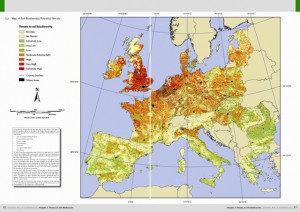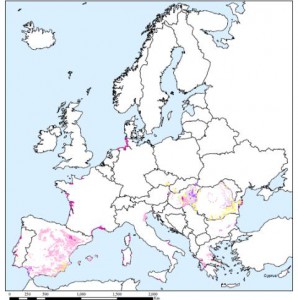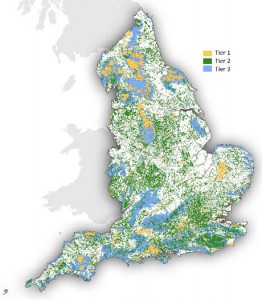- Executive Director of CBD perpetuates myth that we have lost 75% of crop diversity, at high-level meeting, no less.
- 670 agroforestry trees in a database, courtesy of ICRAF.
- Last Rice Today of this year, the 50th anniversary of the International Rice Research Institute (IRRI), summarized.
- Soil community helps maintain species and genetic diversity.
- Good news for some UK bumblebees.
- On the agricultural frontier in South America. Any crop wild relatives there?
- Global Network of National Geoparks expands. Any crop wild relatives there?
Europe maps its soil biodiversity
The Land Management & Natural Hazards Unit of the EU’s Joint Research Centre has just announced the publication of a European Atlas of Soil Biodiversity. Here’s the map showing where soil biodiversity is most at risk.
This is part of JRC’s European Soil Database, which complements similar soil mapping projects for other parts of the world. Grist to the FIGS mill. Here, for example, is the map of saline soils in Europe. Seems like Spain and Hungary may be the places to go if you’re looking for salt-tolerance in crop wild relatives.
Meanwhile, in England they’re worried about how effective their protected areas are at, well, protecting biodiversity, though I’m not sure to what extent that includes the soil kind. And since we’re on the subject of maps, here’s one of the protected area network of England (Tier 1 is the highest level of protection).
We’ve noted here before how our friend Nigel Maxted and his co-workers at the University of Birmingham are working to have crop wild relatives included in the thinking about protected areas in the UK. We know from their research that in fact many important crop wild relatives fall outside the protected area network altogether. It would be interesting to know to what extent these species were considered in the review of the effectiveness of the system.
Avant garde fungi
Ok, so who knew that John Cage was also “an avid mycologist, collector and consumer of mushrooms“?
Nibbles: CGIAR “change”, Cuba, Data, Pavlovsk, Homegardens, Soil bacteria, Thai rice
- GFAR publishes list of Megaprogramme (or whatever they are called) consultations.
- Cuba’s Miscellaneous Crops Under-delegate Rolando Macias Cardenas reports on tomato paste. In other news, Cuba has a Miscellaneous Crops Under-delegate. No, wait, that’s not really news.
- While Sachs et al. moan about better agricultural data, CIAT go out and get it.
- The Pavlovsk TweetMedvedev campaign rolls on.
- “…maximum diversity can be conserved at an intermediate level of income” in Javanese bamboo-tree homegardens.
- Right, so trees “farm” bacteria. What some people will write in a press release.
- Thailand’s rice farmers trying to cope with climate change. Like they have a choice.
Nibbles: Vancouver Island, Organic breeding, Evolution, Roots, Coffee, ABS, Donkey domestication, Domestication, Yam
- Nancy Turner, great food anthropologist, deconstructs dinner on air.
- Breeding for resilience: a strategy for organic and low-input farming systems? Eucarpia conference in Paris in December. Love the ?
- Ford Denison on evolution in reverse: crops that become weeds.
- Nature on evolution in forward: crop breeders look at roots.
- “Shade-coffee farms support native bees that maintain genetic diversity in tropical forests.” Good to know.
- Want to know about Access & Benefit Sharing negotiations? We thought so.
- Ancient people moved their asses.
- Selection during domestication differs from selection during diversification. For the ass too?
- Expect to see Dioscorea hispida appear in spam emails very soon.
- And today’s answer to malnutrition is a blue-grin alga from Lake Chad. Kidding apart, it’s an interesting story.


